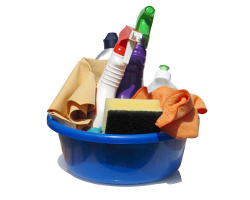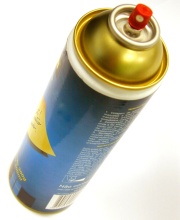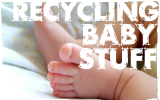Plastic-free and aerosol-free cleaning – how do you do it?
 This week, we’ve had a vaguely spring cleaning inspired week here on Recycle This and looked at a few cleaning related questions – so far, reusing/recycling bleach bottles, making homemade dishcloths/pot scrubbers, and reusing/recycling air fresheners. Today though, I’d like to hear your tips and suggestions for reducing waste from cleaning – for going plastic-free and aerosol-free.
This week, we’ve had a vaguely spring cleaning inspired week here on Recycle This and looked at a few cleaning related questions – so far, reusing/recycling bleach bottles, making homemade dishcloths/pot scrubbers, and reusing/recycling air fresheners. Today though, I’d like to hear your tips and suggestions for reducing waste from cleaning – for going plastic-free and aerosol-free.
Plastics seem to be a core part of modern cleaning products now – from the cleaning solution bottles to the sponges, the film the sponges are wrapped in, many mop buckets and dustpans and brush sets. The latter things may last a while but the former are likely to end up in the bin very soon. Some bottles can be recycled but the sponges and any film-type packaging can’t be. Even more traditional eco-friendly cleaning solutions such as vinegar often come in plastic bottles these days (or at least they do if you bulk buy them).
Similarly, plastic pump-action spray bottles have replaced some cleaning product aerosols but they’re still very common for polishes & foaming sprays (such as oven cleaner) — and aerosol recycling is not exactly common. (They can be recycled and some areas do collect them kerbside, but most don’t.)
Have you made any efforts to reduce the amount of plastic waste generated due to cleaning? Have you swap to different products to reduce plastic packaging waste? We’ve talked about making dishcloths/scrubbers – but any other suggestions for reducing the use of plastic sponges?
And what about aerosols? Have you got any advice for moving away from them?
























I don’t really feel the need to squirt any stuff around when I’m cleaning – almost everything just gets wiped with some eco-washing up liquid on a sponge. I get the eco-liquid from a shop that refills the empty bottles, so the only thing I really need a good alternative for are the plastic sponges.
I’m going to try using onion bags ‘cos I reckon they’d dry out quickly, which is good for killing off germs.
I think mostly I keep down the number of cleaning products and the amount of them by just… not cleaning very much :-)
That’s our tactic too ;)
I know this probably what people want to hear on this site, yet another gadget. You can buy those hand held steam cleaners they clean without the use of chemicals, and it’s a one unit does all kind of thing. I personally have no experience with them, but it seems like a good idea.
I’m using mainly cut up old dish towels for cleaning rags – rinse well and throw them in the wash with other towels.
I do use a sponge with the scrubby side but when the scrubby is worn out I tear it off and use the sponge until it’s shredded and then use the sponge in the bottom of flower pots to cover the hole but not stop it up. Cellulose sponges are biodegrable.
Cleaning products are mainly bleach, white vinegar, ammonia and baking soda. The first three come in recyclable plastic bottles as I buy in gallon sizes and the baking soda is in a cardboard box also recyclable. I also use tea tree oil and lavender for bacterial control on surfaces if we are sick or when we have been exposed to illness like the flu from the doctor’s office.
To clean an oven – wipe up all spills as they occur. Let the oven cool to just warm, use a spatula to remove large amounts but don’t gouge, then use a wet rag with maybe some dish soap to clean it up. For harder to clean areas put about 1/4 cup ammonia in a glass cup, put in oven, leave overnight. In the morning, in a well ventilated area -I also turn on the vent fan -open oven add about two cups water to the ammonia and use it to wipe the oven clean. Be sure to rinse well with water to avoid any residual soap or ammonia. I haven’t used oven cleaner in decades and have only used the self-cleaning option once after a disasterous overflowing berry pie that set off the smoke alarm too!!
I don’t really clean my oven. I reuse tin foil for various things until it’s nearly dead, and then its last reuse is sitting in the bottom of the oven to catch anything that drips.
When it gets too horrible I chuck it out and replace with more recently manky tin foil.
I don’t mention this to anyone who eats anything I have cooked ;-)
I believe I have saved a lot by using microfibre cloths that make the use of cleaning agents unnecessary. I have four that I have been using for 12 (twelve) years now, and they still look like new when coming out out of the washer.
Other than that, the baking soda comes in cardboard boxes, and the vinegar comes in glass bottles (that’s apple cider vinegar – the distilled kind is not available in this country). I use these, together with real soap, also to clean my body. To polish furniture and doors I use olive oil and lemon. The oil comes in glass bottles, the lemon… well it comes with a rind!
Can’t convince my sweaty athlete SO to quit using some stuff, though, but he’s been pretty good anyway and has agreed to change to refillables, which has been possible for the conditioner, the liquid body wash, and ditto hand soap. There is no good replacement for the shampoo he uses, though, but it’s at least a natural and highly concentrated brand, so he doesn’t empty more than a couple of bottles a year.
But, yeh, house cleaning using microfible cloths makes a lot of cleaning agents unnecessary.
I also use old t-shirts and towels sometimes. Especially when olive oil is involved, because I imagine it’s less damaging to the environment and less of a waste energy-wise throwing into the communal organics bin the occasional 10×10 cm scrap of oily cotton textile than using litres upon litres of hot water getting said oil out of the cloth.
In the kitchen I use vinegar which comes in recyclable bottles – I like to use it especially on counters where food will be touching it (silly I know – but if it worked for my great grandmother its good enough for me) – someone else mentioned using a steam cleaner – do this too though only on big jobs. For carpets – I recently bought the bissel green genie which is made with recycled plastic – I’ve got two cats so a quick handy way of cleaning up the occasional hairball etc. is always a plus this does the job well.
Oh, forgot! Every time I have to buy veggies in plastic nets I save the nets and use them as pot scrubs. I just tie them into a “bun” using string, and they’re ready to work.
I do own a bottle of bleach, but use it so seldom it gets dusty! I use baking soda on the kitchen sink.
My stovetop has a white enamel finish, and electric burners, and if life is hectic and it gets icky…Okay, this is be Very Careful tip. I pour just a tiny bit of boiling water on it. Maybe a teaspoon full AVOIDING THE BURNERS. Rub with a cloth or sponge (A thick one, don’t burn yourself!) The awfullest spills wipe right up! Barely have to use elbow grease, even.
And the one chore we all loathe, the toilet…I read this in the Flylady book. Just swish around the brush quickly every time you’re in the bathroom. That’s it. You don’t need to scrub or use the harsh chemicals, and it doesn’t get disgusting.
Pick a cleaner you can use for everything, or at least as much as possible-floors, counters, what have you. One bottle of all purpose liquid to dilute or use straight is better than a dozen different spray or arerosols each with their own rigid function. Not plastic free, but at least you use less.
I also try to use mainly green cleaning supplies as baking soda, vinegar and lemon in order to keep my house chemical free. Thanks for the advices you share with us and regards.
Flat soda water has good cleaning properties so if you’ve drunk all the wine too quickly then here’s an alternative use for your soon to be flat fizz.
Slightly unrelated other carbonates like cola seem to have awesome stian removing properties on metals and porecelains. Doesn’t say much about what they are doing for your stomach lining.
I use vinegar and mix it in an old spray bottle with water, it is great for many types of cleaning including kitchen floor tiles and bathtubs and showers.
I use baking soda instead of the special cleanser that is sold for flat-top electric stoves, it works just as great. I also use baking soda for scrubbing other surfaces such as sinks and lightly stained cooking pans.
I use worn-out t-shirts & socks to clean with, and cut down holey bath towels into squares, zig-zag the edges with scraps of threads and use those for cleaning rags.
A couple of teaspoons of Eucalyptus oil mixed with water in a spray bottle works as well, or better than any commercial sprays, and smells better. It is antibacterial. Can be used neat with caution – patch test on paint and plastic.
Cleaning products are mainly bleach, white vinegar, ammonia and baking soda. The first three come in recyclable plastic bottles as I buy in gallon sizes and the baking soda is in a cardboard box also recyclable